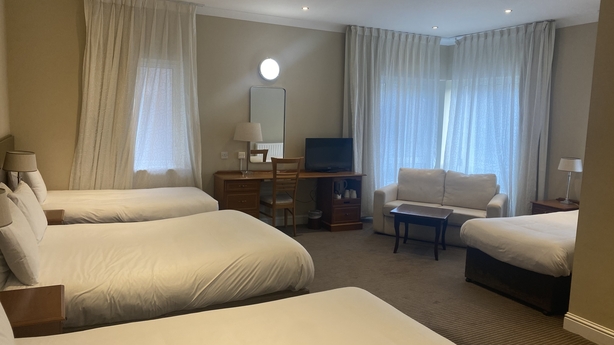Many hotels providing accommodation to Ukrainian refugees are being offered lower rates under new contracts.
RTÉ News has spoken to one accommodation provider who said that the new rates would amount to a cut of €1,500 per week or €6,000 a month, even when taking into account contributions which their Ukrainian guests must now make directly to them under the new contract.
The hotelier said that he has been told that this is a "take it or leave it offer."
They said that they are aware of another hotelier who was being offered a higher rate under the new contract, and that when they had queried this with an official at the Department of Children, Equality, Disability, Integration and Youth, they were told that the other business "should not have mentioned what they are offered as there is a confidentiality agreement".
RTÉ News is aware of another hotel whose rates have not been reduced under the new contract.
According to a spokesperson for the Department, "the rates are categorised based on the type of accommodation offered."
It comes as the department confirmed that the first Ukrainian residents are now expected to begin moving into modular homes in early June, following a report in The Sunday Times that the delivery of the rapid-build homes has been delayed again.
Fine Gael Senator Martin Conway said that he is "disgusted" by what he called the "bully boy tactics" being taken towards "hoteliers who have done business with them for the last number of months."
Mr Conway said he believed a "take it or leave it" approach also amounted to "emotional blackmail... given the fact that they know that hoteliers have developed personal relationships with these people who have come from a warzone."
In a statement the Department of Children, Equality, Disability, Integration and Youth said that "Government recently made the decision to standardise rates and terms across all of our Ukrainian BOTP (Beneficiaries of International Protection) Emergency Accommodation Contracts".
"This new policy has been put into effect to ensure consistency and equality in the rates being offered to emergency accommodation providers," the statement said.
"The goal is to ensure the best value possible for the tax-payer, by maximising the accommodation it is possible to provide within the current budget.
"The Department believes that these are fair and sustainable rates, based on location and type of accommodation offered.
"Accommodation providers are private businesses and can choose whether or not to contract with the Department to provide accommodation."
Read more: Hoteliers owed six-figure sums for housing refugees warn of contract exodus

The rates are calculated on a per adult and per child basis, with the highest rate paid for a single adult, and lower rates paid for supplementary adults and children.
Under the new contracts adult guests must now contribute €10 per day for food, and the contribution for children is €5 per day.
Personal laundry and pet charges are also no longer covered under the new contracts.
Two more hoteliers whose contracts are due to expire soon confirmed to RTÉ News that while they have not received their new terms yet, they had both heard from other hoteliers that the new rates were "a lot less favourable".
"I need to see what the new contract is but I would definitely consider moving away from it (continuing to provide accommodation to Ukrainians) at this stage," one hotelier who is still awaiting payments dating back to mid-November told RTÉ News.
"We have to get some money in the bank at some stage, you know?"
However others have said they feel that they are "over a barrel" and have little choice to but accept the lower rates.
"I'll have to spend an awful lot of money to put the place back to what it was, and I will loose two or three months more of the tourist season as a result," one small hotel operator told RTÉ News.
The Department said that two accommodation contracts were ending "in the coming days."
"43 Beneficiaries of Temporary Protection were informed in March that they are moving accommodation in April," a spokesperson said.
Another hotelier has raised concerns that the new rates may encourage accommodation providers to "stack" guests, by placing groups of unrelated single adults in rooms together for example.
Senator Conway said that he is already aware of instances of this happening.
"This obviously poses serious health and safety concerns," Mr Conway said.
"I am deeply concerned that small little box rooms in hotels, which are absolutely suitable for a single person or a couple are now going to have bunk beds with four or five people in them."
Modular homes
Meanwhile, the Government has approved the construction of 700 rapid build homes with the potential to house up to 2,800 individuals in family units to be built on State-owned land.
In December last year a Department spokesperson told RTÉ News that enabling works had been completed on five sites, and it was then expected that homes would be installed on a phased basis on these sites during February and March 2023.
Earlier this year Minister Roderic O'Gorman said that rapid build homes were expected to be ready by Easter.
But a spokesperson for the Department for Integration said that the timeframe for the installation of the rapid build homes has recently been recalibrated.
In a statement, they said that this was in the light of experience to date with evaluation and assessment of the suitability of sites, engagement with representatives of communities located adjacent to sites, and the timescale for the manufacture of the homes required.
It said that it is now expected some homes will start to be installed on a phased basis during March/April 2023 as site enabling works across a range of locations are completed.
The statement said that it is expected that residents will begin to move in to the first homes in early June.
With additional reporting by Helen Donohue







